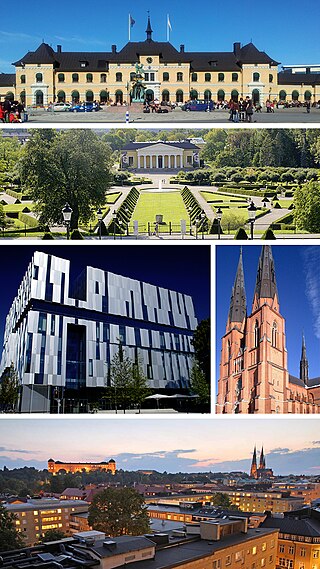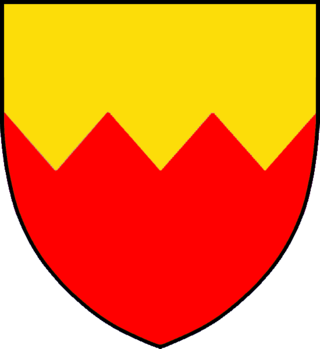
Uppsala is the capital of Uppsala County and the fourth-largest city in Sweden, after Stockholm, Gothenburg, and Malmö. It had 177,074 inhabitants in 2019.

Olaus Rudbeck was a Swedish scientist and writer, professor of medicine at Uppsala University, and for several periods rector magnificus of the same university. He was born in Västerås, the son of Bishop Johannes Rudbeckius, who was personal chaplain to King Gustavus Adolphus, and the father of botanist Olof Rudbeck the Younger. Rudbeck is primarily known for his contributions in two fields: human anatomy and linguistics, but he was also accomplished in many other fields including music and botany. He established the first botanical garden in Sweden at Uppsala, called Rudbeck's Garden, but which was renamed a hundred years later for his son's student, the botanist Carl Linnaeus.

Olof Rudbeck the Younger or Olaus Rudbeckius d.y. was a Swedish explorer, scientist, botanist, ornithologist and rector of Uppsala University.
König is the German word for "king". In German and other languages applying the umlaut, the transliterations Koenig and Kœnig, when referring to a surname, also occur. As a surname in English, the use of Koenig is usual, and sometimes also Konig. Notable people with the name include:
Bergstrom or Bergström is a Swedish surname. It derives from the Swedish words berg meaning mountain and ström meaning stream and may refer to:
Andersson is a Swedish language surname, a form of the surname Anderson. Andersson is, if several spelling variants are included, the most common surname in Sweden. Notable people with the surname include:
Jonsson is a surname of Nordic, mostly Swedish, origin, meaning son of Jon. In Iceland the name is a part of the Patronymic name system. Notable people with the surname include:
Karlsson is a Scandinavian patronymic surname meaning "son of Karl" or "Karl's son". It is one of the most common surnames in Sweden and has a number of alternative spellings. Apart from Karlsson, Carlsson is the most common spelling variation. Karlson and Carlson also exist, but are uncommon, as are Carlzon and Qarlsson. The parallel Danish-Norwegian forms are Karlsen and Carlsen.
Johan is a Scandinavian and Dutch form of Iohannes, the Latin form of the Greek name Iōánnēs (Ἰωάννης), from the Hebrew name Yochanan, itself derived from the extended form Yehochanan, meaning "Yahweh is Gracious". It is uncommon as a surname. Its English equivalent is John.
Åke is a masculine Swedish given name, possibly derived from the medieval Germanic name Anicho, derived from ano meaning "ancestor". In Sweden, May 8 is the Name day for Åke. There are variant spellings, including the Danish/Norwegian Åge or Aage. Åke is uncommon as a surname. People with the name Åke include:
Rune is a unisex, though predominantly masculine given name derived from the Old Norse word rún, meaning "secret". It is earliest attested in a runestone as runi. It is a common name in Norway, Sweden, Denmark, and popular in Belgium, where it ranked in top thirty names for baby boys in 2006 and was the tenth most popular name for boys in 2006 in the Flemish Region of Belgium. Rúni, a variant of the name, was among the ten most popular names given to baby boys in the Faroe Islands, Denmark, in 2007. In the United States, Rune is a much less common name- in 2021 there were only 35 baby boys and only 9 baby girls named Rune. Notable people with the name include:
Historiens 100 viktigaste svenskar is a book by Niklas Ekdal and Petter Karlsson, published in 2009. Before the book was released, the list was published by Dagens Nyheter between 14 April and 6 May. The book is a list of the 100 Swedes that according to the authors have had "the greatest influence on Swedish people's lives, and also people's lives around the world". There are 84 men and 16 women on the list. Around 40 of them lived in the previous century, and 16 were still alive as of the book's publication.

The Rudbeck family, also spelled Rudebeck or von Rudebeck is a Swedish noble family, originating from Northern Schleswig. They were ennobled in 1719 by Queen Ulrika Eleanora and in 1776 awarded with the title of Baron in Sweden. The family is related to the Nobel family.
Olle is a masculine given name, often a short form (hypocorism) of Olof, and a surname. It may refer to:
Jan Anderson or Andersson is the name of:
Håkansson, Hakansson, Håkanson or Hakanson is a Swedish surname. Notable people with the surname include:
The Björkén Prize is a scientific award given by Uppsala University. It is awarded for outstanding research in science and the theoretical branches of medicine. The prize was established in 1893 from a donation given by university lecturer John Björkén (1833–1893). Björkén was a physician and medical assistant professor in surgery and obstetrics at Uppsala. The prize was first awarded in 1902 on the day of his death.
Ove is a Scandinavian given name. It is derived from the Old Danish name Aghi, itself probably a diminutive of the prefix Agh-, from the Germanic *aʒ-. The name Ove is earliest attested in 1434 in Scania.
Olle Andersson may refer to:



